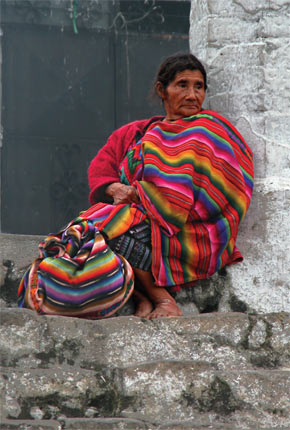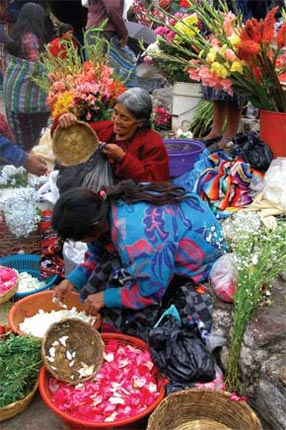There are definitive moments in life. As one mellows, or ages, depending on perspective, these moments become clearer and more meaningful. Often they relate to loved ones either entering or leaving our lives. Some of them bring on fear and the adrenaline flows – or panic as we recall moments of major jeopardy. Others are friendly and bring on a smile of satisfaction as we recall an amusement, an unusual contentment, or some special pleasure. Often these recollections lie dormant, forgotten, out of mind until suddenly they surface, often at night, triggered no doubt by some outside stimulation. Then we relive them either enjoyably or with trepidation. Many of these moments occur for me while remembering overseas trips.
Guatemala, in Central America, remains one of the best-kept secrets in the tourist industry. Barb and I have visited it a number of times and find it most tourist friendly. There are many sites of interest in this country, the people are most gracious, accommodations by and large are clean and comfortable, and best of all the price is right. On one of these trips we were encouraged by some friends to include a visit into the highlands – specifically to try to catch the weekend market at Chichicastenango. Easier said than done. In fact, we found it almost impossible to make that trip on our own, so we arranged to join a small tour through a reputable agent.
The little bus that took us into the hills held eight passengers, and it was full. We left Guatemala City early Sunday morning and wound ever higher on narrow crooked roads. Lush tropical vegetation surrounded us on all sides and obscured some of the deep treacherous ravines we were passing. As we climbed higher, we found ourselves following a stream, which often entertained us with huge waterfalls cascading down into placid pools.
After a four-hour drive we arrived at Chichi at about noon. The topography had changed dramatically from the flat city streets we had left to steep ravines and now to a number of flat or gently rolling hills. This was acceptable farming country with fields of corn and other crops. Mostly vegetables began to appear. Our hotel was a converted monastery, over one hundred fifty years old, made of adobe block. It had no central heating, and the bathroom had been added by attaching a six-foot by eight-foot structure to the side of the building. There was a one-foot step required to enter this attached outhouse. The purpose of the platform was to allow the plumbing to both enter and leave. Ingenious! Another interesting innovation was the roof. The original cover had long since disappeared and been replaced by sheets of galvanized plates. There was no need for insulation. The sheets were neatly laid over rough wood joints.
We were anxious to join the crush of people who now populated the town square. It was market day and locals from miles around had come to buy and sell. In general, it was organized mayhem. The town square was chock-full of stalls arranged in crooked lines; and passages between rows were restricted. I would guess that between our hotel and the church, located on the opposite end of the square, there were between ten and fifteen stalls. Probably about the same number going in the perpendicular, totaling hundreds of vendors displaying their wares.
Each stall housed its own specialty. Many sold vegetables and other food crops. A few contained manufactured goods, which no doubt had been brought up from the city. Many handmade items covering a broad spectrum of the art world filled the stalls to overflowing. There was some order to this chaos as certain categories were grouped. Shawls, blouses, skirts, and boots comprised one such category. Dolls, whistles, tops, and other toys made of wood, cloth, or stone were in another. Finally household items like pots and pans appeared.
On the church steps a band of actors performed amid a heavy dose of incense. I did not understand the significance of their drama but felt it must have been religious because spectators would light candles from their incense and enter the church. This whitewashed Catholic Church had stood here for hundreds of years and over that time had apparently been altered with a great deal of pre-European religious tradition. Statues of strange saints sat in alcoves, all with features resembling the local population. Even Mother Mary had a decided pre-Columbian face.
We spent hours in the market, caught up in the diversity, looking very out of place among the color-fully dressed locals with the blackest of hair and eyes imaginable. Generally we were ignored – accepted as occasional interlopers into an affair that had changed very little in eight, maybe ten, generations.
We ate our evening meal in the dining hall of our hotel. All vegetables freshly cooked, piles of flat, thick, fried bread, and lots of chicken. Washed down with wine, it was only then that we realized there was no electricity here. Candles were not on the table for decorative atmosphere – they were there for light. We were given a lamp and sent off to our rooms to spend the evening as we chose.
Entering our room was like stepping back in time. A huge fire blazed in one corner, casting flickering shadows throughout the room. Years before, robed monks had preceded us here – the beds undoubtedly not as soft, but nevertheless just as cozy. The chill of night in this mountain air was driven away by the crackling fire and exchanged for the sweet smell of burning fruitwood.
It began to rain, thundering down on the metal roof. We dug deeper under the covers. A peaceful, secure, and protected feeling filled our minds. The fire crackled and gave off warmth. I lay there cherishing the moment. All five senses alert. The color of the afternoon, the sounds of the rain on the roof, the odor of incense and fruitwood burning, the taste of good food and wine, and the feeling of warmth about me. I shall never forget that evening. It will always remain part of me. Different sights and sounds will bring it back to mind, always pleasant, always peaceful.
Harry Hubinger is a retired engineer who operated his own company for twenty years. He first began traveling outside the United States on business, but these visits escalated upon his retirement. He has now traveled to 115 countries and continues to add several new ones each year. In 1998 he began writing his humorous and insightful articles for a supplement to a local newspaper. These stories, based on experiences most travelers could identify with, soon earned him a wide local following. In 2005 he published his first book, Stamps in My Passport—a collection of travel vignettes. Harry has lived in Danville for almost forty years and has volunteered with the Danville Police Department for the past seven. His wife, Barbara, is the detail chronicler of their trips. Her journals provide the background for Harry’s broader view. You can get his book at: www.travelbookspub.com.


Leave a Reply